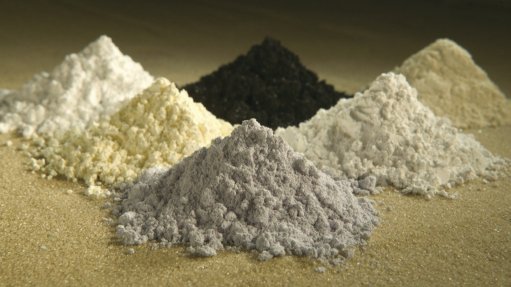
Rare earth oxides
London-listed Rainbow Rare Earths has entered into a master agreement with Moroccan phosphate products producer OCP and Moroccan university Mohammed VI Polytechnic University (UM6P) to investigate and develop the optimal technique for rare earth element (REE) extraction from phosphogypsym.
Phosphogypsum consists mainly of calcium sulphate and is a waste by-product of phosphoric acid production.
OCP and UM6P have both built up significant intellectual property assets, know-how and expertise in the field of phosphogypsum processing, which provides a synergistic opportunity for joint development with Rainbow, given Rainbow’s own expertise on rare earths extraction and processing.
The company explains in a statement that its own work at the Phalaborwa rare earths project, in South Africa, which incorporates separation technology licenced from US-based K-Technologies, will complement OCP and UM6P’s respective expertise, including on adapted separation technologies.
Rainbow has a proven flowsheet for the extraction of REEs from phosphogypsym for the Phalaborwa project, and therefore seeks to develop a successful flow sheet and economic extraction of REEs from OCP's phosphogypsum as a standalone project.
CEO George Bennett explains that each deposit is unique and OCP's phosphogypsum deposit, combined with Rainbow's expertise, will prove invaluable in developing a successful flowsheet with OCP.
He confirms that only once the OCP testwork results are conclusive and the flowsheet can be proved at lab-scale, will the parties look to build a pilot project.
“Recognising the enormous potential of phosphogypsum as a valuable source of rare earths, our team is focused on securing opportunities for both collaboration and expertise sharing, as well as gaining access to new supply as shown by our recently announced agreement with a diversified chemicals group in South Africa,” adds Bennett.
He further states that the successful global transition to clean energy is reliant on a considerable increase in supply of critical materials such as neodymium and praseodymium, which is required in permanent magnet technology.
A lack of high-quality REE mineral deposits globally has led to companies seeking alternative sources of supply, particularly secondary sources, such as the mining of industrial waste, including phosphogypsym, or the recycling of waste electronic devices.
Therefore, Rainbow continues to explore the best ways of producing rare earths responsibly from secondary sources, which removes significant time, risk and cost from the overall project timeline.